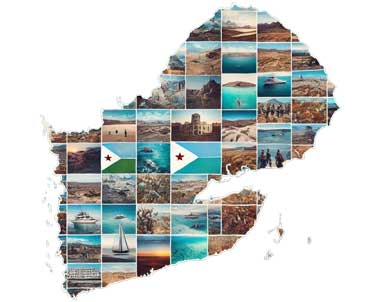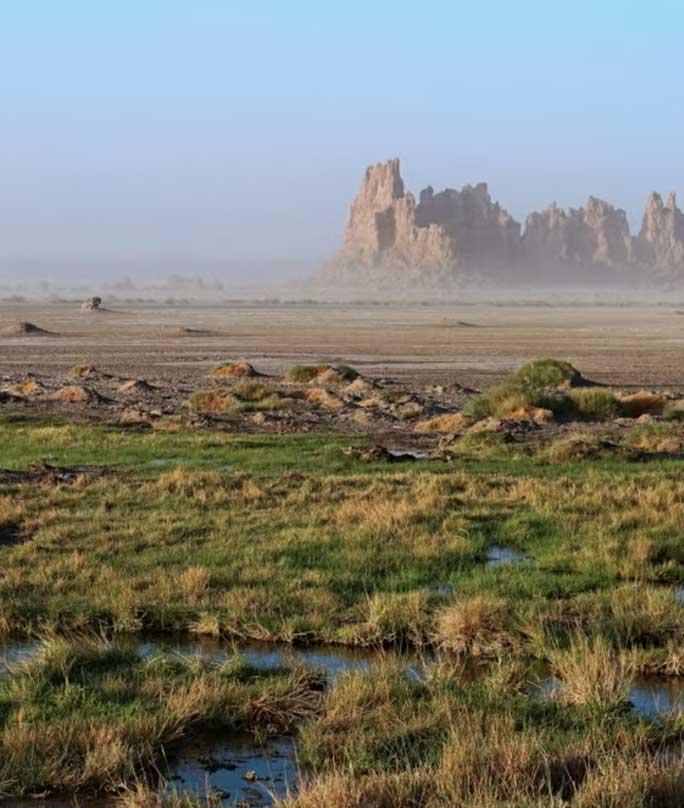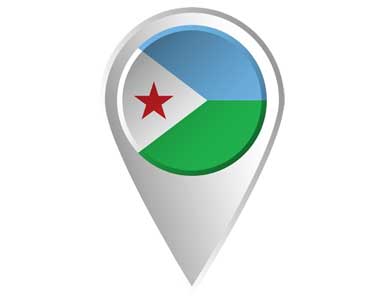
COUNTRY GUIDE
Learn about Djibouti from its landscape and cuisine to the accommodation and activities available

Strategically located at the crossroads of the Red Sea and the Gulf of Aden, Djibouti is known for its dramatic landscapes and rich cultural heritage. Its terrain includes volcanic mountains, salt flats, and a rugged coastline. Despite the arid climate, resilient flora such as acacias, cacti, and drought-resistant shrubs thrive. The fauna is equally adapted to the environment, with camels, gazelles, and various bird species making up the wildlife.
Djibouti’s history is closely tied to its strategic location as a vital trading post. Situated at a key maritime intersection, it has attracted Arab traders and European powers for centuries. It became a French colony in the late 19th century, and even after gaining independence in 1977, Djibouti has maintained its significance as a hub for trade and diplomacy, capitalising on its location between Africa and the Arabian Peninsula.
The population of Djibouti is predominantly Somali, with smaller groups like the Afar. Islam is the dominant religion, reflecting the cultural and religious influences from the broader Islamic world. Arabic and French are the official languages, highlighting both its ties to the Arab world and its colonial history with France.
Djibouti’s economy is driven primarily by its strategic location. Port services are a key economic sector, with Djibouti’s port playing a crucial role in global trade, particularly for landlocked Ethiopia. Additionally, the country’s geopolitical importance is underscored by its role in international military cooperation, hosting bases for the United States, France, and China. This military presence not only boosts the economy but also positions Djibouti as a key player in regional security.
Efforts are underway to diversify the economy beyond ports and military cooperation. Djibouti has been investing in infrastructure, including railways and free trade zones, aimed at enhancing its role as a regional logistics hub. While tourism remains a smaller industry, the country’s natural attractions, such as Lake Assal, one of the saltiest bodies of water in the world, and the Ardoukoba volcano, hold potential for growth in this sector.
Despite its small size and harsh environment, Djibouti plays a significant role on the global stage. By leveraging its strategic location and fostering international ties, it has established itself as a crucial player in both economic and geopolitical spheres. Djibouti’s ability to balance its rich cultural heritage with modern development continues to position it as an important nation in the Horn of Africa.
Marhaban ! Whether for business, exploration, or a longer stay, you will experience the vibrant mix of our landscapes and cultures that make Djibouti truly unforgettable.

Learn about Djibouti from its landscape and cuisine to the accommodation and activities available

Get essential facts about the climate, the people, important dates and more, before you travel.

Discover the different regions of Djibouti so you can plan exactly where you want to go.
Your guide to Djibouti, from its geography and history to its people and culture, including essential travel facts, as well as useful location information.
Find local connections in Djibouti from tour operators, hotels, businesses, individuals and more, to provide you with the pertinent local knowledge you need.
Enjoy browsing through stunning images, viewing videos and listening to the music of Djibouti and check what events, shows, and more are happening when you visit.

We are a multi-disciplinary team working together to create awesome websites that provide you with all you need to know about the countries of the Indian Ocean
Office No.2 14,Avenue sodnac
Quatre-Bornes
Copyright © 2022 MYP Online Marketing. All Rights Reserved. Conceptualised by MYP Online Marketing